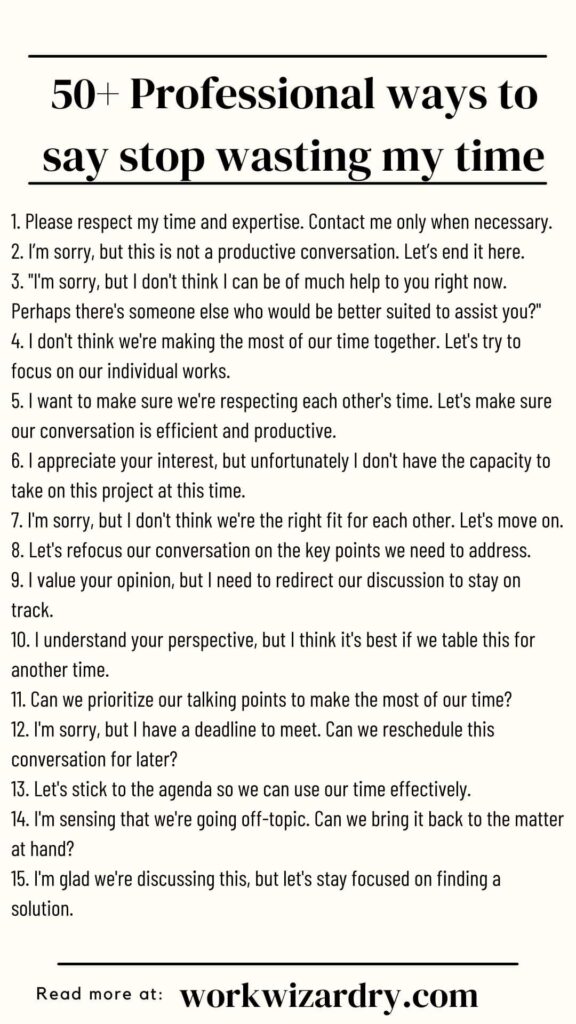Time is a precious resource, and in a professional setting, it is crucial to use it wisely.
However, there are times when we find ourselves caught in conversations or situations that seem to drag on without purpose.
Effectively communicating the need to redirect the focus without causing offense requires finesse and tact.
In this blog post, we will explore how do you professionally say stop wasting my time and a variety of situations where you may encounter time-wasting and provide over 50 examples and tips on how to politely and respectfully address these situations.
Discover how to navigate these conversations respectfully, ensuring productivity and efficiency in your professional interactions.
How do you professionally say stop wasting my time?
When faced with a situation where you feel someone is wasting your time, it is essential to address the issue professionally and respectfully.
Instead of using a direct and potentially confrontational phrase like “stop wasting my time,” it is more effective to express your concerns in a clear and polite manner.
First and foremost, it is important to maintain composure and avoid displaying frustration or impatience.
Take a deep breath and approach the conversation with a calm demeanor.
Begin by acknowledging the value of their time and yours, emphasizing the need for efficient communication and productivity.
To express your concerns, you can start by highlighting the purpose of the conversation or meeting.
Remind the other person of the specific objective or goal that needs to be achieved.
This helps refocus the conversation on the task at hand and reduces unnecessary digressions.
If you feel that the discussion is drifting off-topic or becoming unproductive, you can politely steer the conversation back on track.
Acknowledge any valid points or contributions made by the other person, but gently guide them back to the main subject by asking relevant questions or summarizing the key points discussed so far.
Also read: How To Professionally Say Do It Yourself Or Do Your Job? (100 Examples And Tips)
It is also beneficial to establish and communicate a clear agenda or timeline for the conversation.
By setting expectations from the outset, you can help ensure that everyone remains focused and avoids wasting time on irrelevant topics.
This can be done by stating the specific topics to be covered or by suggesting a timeframe for each agenda item.
Using active listening skills is crucial when addressing the issue of time wasting.
Show genuine interest in the other person’s perspective and ideas, but be mindful of keeping the conversation on track.
Reflect their points back to them to demonstrate your understanding and offer concise responses or suggestions that steer the conversation forward.
When concluding the conversation or meeting, reiterate the key takeaways and action points.
Emphasize the importance of time management and the need for everyone involved to make the most of their time.
Express gratitude for their contributions and commitment to finding solutions efficiently.
Remember, it is essential to approach these situations with respect and professionalism.
By focusing on the goal, establishing clear objectives, practicing active listening, and gently guiding the conversation, you can address the issue of time wasting while maintaining a positive and productive atmosphere.

50+ Professional ways to say stop wasting my time
Here is a list of professional ways to say stop wasting my time for different situations at workplace and in any professional settings:
1. In a one-on-one conversation with a coworker:
a. “I value our discussion, but let’s keep it concise to respect each other’s time.”
b. “I appreciate your insights, but let’s stay on topic and address the main issue at hand.”
c. “To make the most of our conversation, let’s focus on finding solutions rather than dwelling on irrelevant details.”
d. “Let’s maintain a clear direction in our conversation to avoid wasting time on unrelated matters.”
e. “To maximize the efficiency of our conversation, let’s address the critical points and avoid getting sidetracked.”
2. In a business meeting:
a. “I appreciate your input, but let’s focus on the agenda and avoid going off-topic.”
b. “Let’s make sure we’re discussing relevant points and not veering into unrelated discussions.”
c. “We have a limited amount of time for this meeting, so let’s stick to the main issues at hand.”
d. “I value your opinions, but let’s keep the conversation concise and to the point.”
e. “To ensure efficiency, let’s move on from this topic and address the pressing matters.”
3. During a sales call:
a. “I understand you have questions, but let’s address them quickly so we can proceed with the sales presentation.”
b. “I appreciate your interest, but let’s focus on the key features and benefits of our product.”
c. “To make the most of our time, let’s avoid going into unnecessary details and focus on how our solution can meet your needs.”
d. “I’m here to provide you with information, so let’s discuss your requirements and see how our product aligns with them.”
e. “To ensure an efficient conversation, let’s keep our discussion centered around how our solution can benefit your business.”
4. In an email exchange:
a. “I appreciate your message, but let’s try to keep our communication concise to avoid unnecessary back-and-forth.”
b. “To expedite the process, let’s focus on the main points and avoid delving into peripheral details.”
c. “Please provide the necessary information without excessive elaboration to save time for both parties.”
d. “Let’s aim for brevity in our correspondence to ensure effective communication and timely responses.”
e. “To streamline our email exchange, let’s stick to the essential aspects and avoid unnecessary digressions.”
5. During a team brainstorming session:
a. “I encourage everyone to contribute, but let’s try to keep our ideas relevant to the topic at hand.”
b. “To make the most of our brainstorming session, let’s avoid going down tangents and focus on generating actionable ideas.”
c. “I appreciate your creativity, but let’s stay on track and brainstorm within the scope of the project.”
d. “Let’s prioritize quality over quantity and focus on presenting well-thought-out ideas.”
e. “To ensure a productive session, let’s avoid repeating ideas and instead build upon existing suggestions.”

Examples on how to professionally say stop wasting my time
Here are some more polite and professional ways to say stop wasting my time:
1. Please respect my time and expertise. Contact me only when necessary.
2. I’m sorry, but this is not a productive conversation. Let’s end it here.
3. “I’m sorry, but I don’t think I can be of much help to you right now. Perhaps there’s someone else who would be better suited to assist you?”
4. I don’t think we’re making the most of our time together. Let’s try to focus on our individual works.
5. I want to make sure we’re respecting each other’s time. Let’s make sure our conversation is efficient and productive.
6. I appreciate your interest, but unfortunately I don’t have the capacity to take on this project at this time.
7. I’m sorry, but I don’t think we’re the right fit for each other. Let’s move on.
8. Let’s refocus our conversation on the key points we need to address.
9. I value your opinion, but I need to redirect our discussion to stay on track.
10. I understand your perspective, but I think it’s best if we table this for another time.
11. Can we prioritize our talking points to make the most of our time?
12. I’m sorry, but I have a deadline to meet. Can we reschedule this conversation for later?
13. Let’s stick to the agenda so we can use our time effectively.
14. I’m sensing that we’re going off-topic. Can we bring it back to the matter at hand?
15. I’m glad we’re discussing this, but let’s stay focused on finding a solution.
16. Can we wrap up this conversation? I have other pressing matters to attend to.
17. I think we’ve covered everything we need to. Do you have any final questions before we conclude?
18. I appreciate your enthusiasm, but let’s stick to the relevant details.
19. I’m sorry, but I don’t have the necessary expertise to help you with this. Can I refer you to someone who can?
20. Can we make sure our conversation is productive by focusing on the most important issues?
Conclusion:
In conclusion, mastering the skill of professionally addressing time-wasting situations is an invaluable asset in any professional’s toolkit.
By employing the strategies and tips shared in this blog post, you can assertively communicate your need for productive and focused conversations while maintaining respect and professionalism.
Remember, it’s not about being confrontational but rather redirecting the conversation back to its intended purpose.
With practice and a mindful approach, you can effectively navigate these situations, ensuring that valuable time is utilized efficiently.
Embrace these techniques, and watch as your professional interactions become more purposeful, productive, and respectful of everyone’s time.




